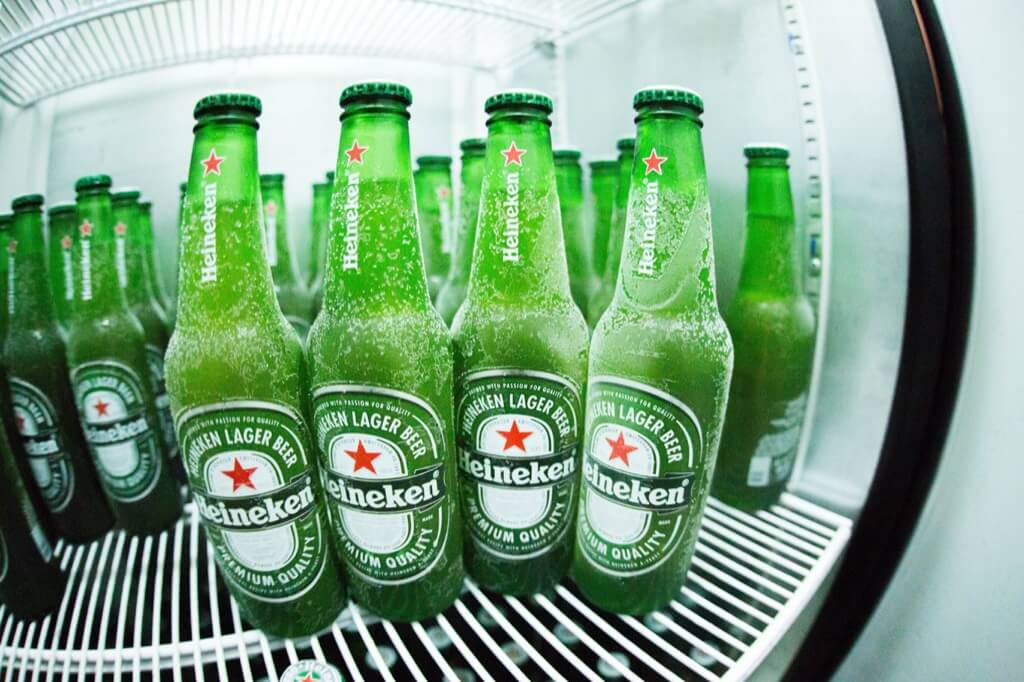Beer has maintained its steadfast commitment to glass and metal containers, shying away from the ubiquity of plastic seen in other beverages like soda. This curious divergence prompts us to question the reasons behind this distinctive choice.
While plastic has revolutionized our daily lives with its cost-effectiveness, adaptability, and recyclability (albeit contingent on conscientious disposal), the realm of beer seems resolute in its preference for glass and aluminum. Could this preference be a matter of taste, style, or perhaps something more intricate at play?
Surprisingly, in some regions like the UK, plastic beer bottles are a common sight at local fairs and public events. During the 2012 Olympic Games in London, Heineken, the official alcohol sponsor, distributed over a million plastic bottles of beer, citing environmental concerns and possibly security measures as reasons for this shift.
However, the choice of packaging material extends beyond mere aesthetics. Plastic’s permeability to gases, particularly carbon dioxide, poses a significant challenge for preserving the effervescence of beer. Unlike glass, which acts as a reliable barrier to oxygen and carbon dioxide, plastic allows for a faster escape of these gases, potentially altering the beer’s flavor and quality.
Furthermore, the potential leaching of toxins from plastic, such as the hazardous metalloid antimony present in commonly used materials like PET (polyethylene terephthalate), raises concerns about the safety of the beverage. Elevated temperatures can escalate this leaching process, breaching safety guidelines and diminishing the overall drinking experience.
In contrast, aluminum cans, with their moisture-resistant properties and protective polymer coating, offer a viable alternative for preserving beer without compromising its taste or safety. Additionally, the opaque nature of aluminum cans provides superior protection against harmful UV rays, a feature that colored plastics would struggle to replicate without disrupting existing recycling systems.
Notably, the manufacturing and pasteurization processes also pose challenges for plastic bottles, as they are more prone to deformities and breakages under the intense heat required for pasteurization. Consequently, the industry grapples with the balance between cost-effectiveness and product quality.
While some breweries are exploring the potential of plastic beer bottles, the enduring reign of glass and aluminum cans continues to dominate the market, signaling a preference for reliability and quality over convenience.
The Environmental Impact Of Brewing Companies’ Choice Of Packaging
Preserving Flavor and Sustainability
In considering the future of beer packaging, the focus remains firmly fixed on preserving the rich flavor of the beverage while ensuring sustainable practices. While plastic bottles may seem alluring for their convenience, their potential to compromise the taste and safety of the beer poses a significant dilemma for both brewers and consumers. As an environmentally conscious consumer, you might find yourself increasingly drawn to packaging options that prioritize sustainability and taste preservation simultaneously.
Challenges of Plastic Leaching and Environmental Concerns
As the demand for convenience continues to influence consumer behavior, the environmental implications of plastic leaching cannot be overlooked. With the rising temperatures globally and the subsequent potential increase in antimony leaching from plastic bottles, the long-term consequences on both the environment and human health could become a pressing concern. It’s vital to remain informed about these intricate interactions between packaging materials and the environment to make informed decisions for the future.
Innovation and Sustainability in Brewing Practices
The beer industry, renowned for its rich traditions, is gradually embracing innovative practices to minimize its environmental footprint. With the proliferation of eco-friendly alternatives such as aluminum cans and biodegradable packaging materials, breweries are actively seeking ways to maintain the quality of their product while aligning with sustainable practices. By staying informed about these emerging trends, you can actively support environmentally conscious breweries and contribute to the preservation of our planet.
Balancing Quality and Environmental Impact
Navigating the intricate balance between ensuring product quality and minimizing environmental impact remains a pivotal challenge for the brewing industry. While the allure of novel packaging options might seem enticing, it’s essential to assess their long-term impact on the environment and the overall beer-drinking experience. By advocating for sustainable brewing practices and informed consumer choices, you can actively contribute to the preservation of both the quality of your favorite beverage and the health of our planet.
Upholding Environmental Responsibility
As a conscientious consumer, your role in upholding environmental responsibility within the beer industry is instrumental in shaping a sustainable future. By actively supporting breweries that prioritize environmentally friendly packaging and production methods, you can become an advocate for change and contribute to the collective efforts aimed at preserving our planet for future generations. Embracing a proactive stance toward sustainable beer packaging is not only beneficial for the environment but also reflects a commitment to fostering a greener, more sustainable future.
Cultural and Historical Significance in Beer Consumption
Beer’s packaging choices are intricately intertwined with its cultural and historical significance, reflecting a deep-rooted reverence for tradition and community. Understanding the historical context and cultural symbolism attached to the use of materials like glass and metal provides crucial insights into the enduring legacy of beer packaging. By delving into the historical narratives of brewing practices, breweries can preserve the essence of tradition while embracing sustainable packaging solutions that resonate with contemporary values and environmental consciousness.
Consumer Perception and Psychological Impact on Packaging Choices
Consumer perception and the psychological impact of packaging choices play a pivotal role in shaping the beer industry’s reluctance to adopt plastic containers. By unraveling the intricate web of consumer psychology and subconscious associations with different packaging materials, breweries can gain valuable insights into the underlying motivations guiding consumer preferences. Understanding the psychological underpinnings of packaging choices empowers breweries to align their strategies with consumer values and perceptions, fostering a stronger connection between consumers and their preferred beverage.
Socioeconomic Implications of Packaging Decisions in the Beer Industry
Analyzing the socioeconomic implications of packaging decisions within the beer industry reveals a multifaceted landscape that extends beyond environmental concerns. Delving into the impact on local economies, employment dynamics, and supply chain intricacies offers a comprehensive understanding of the industry’s packaging preferences.
By critically examining the socioeconomic implications, breweries can make informed decisions that balance environmental sustainability with the socio-economic well-being of local communities, contributing to a more holistic and responsible industry ecosystem.
Regulatory Framework and Legal Constraints Influencing Packaging Choice
The beer industry’s packaging decisions are intricately shaped by the regulatory framework and legal constraints governing packaging materials. Scrutinizing the interplay between governmental policies, industry standards, and environmental regulations sheds light on the intricate challenges and opportunities that breweries encounter. By advocating for progressive policies and fostering collaboration between regulatory bodies and industry stakeholders, the beer industry can create a conducive environment for sustainable packaging solutions that comply with legal requirements, contributing to a more sustainable and compliant brewing landscape.
Technological Advancements and Innovations in Sustainable Packaging
Exploring the latest technological advancements and innovations in sustainable packaging presents a promising pathway for the beer industry to reconsider its conventional packaging choices. Investigating the viability of biodegradable materials, advanced recycling technologies, and cutting-edge packaging solutions offers a glimpse into a future where sustainability and quality can coexist harmoniously.
By embracing technological innovations, breweries can spearhead a more environmentally conscious approach to beer packaging, fostering a culture of innovation that prioritizes both product integrity and environmental responsibility.




